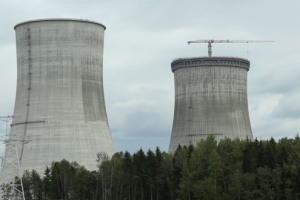Ru
|
Eng
IAEA IRRS team produces set of recommendations for Belarus
14.10.2016

The IAEA Integrated Regulatory Review Service (IRRS) team has produced a set of suggestions and recommendations for Belarus. The information is posted on the website of the Nuclear and Radiation Safety Department of the Belarusian Emergencies Ministry (Gosatomnadzor), BelTA has learned.
The team offered 25 recommendations and 20 suggestions for Belarus to improve the regulatory framework both at the top level and at the level of technical regulations, enhance the authorization and oversight procedures, develop the system of regulatory technical support, and organize public discussion of major decisions of the regulatory authority and other issues.
“The recommendations and suggestions produced by the IAEA IRRS team largely coincide with the conclusions of the self-assessment conducted in Belarus in the run-up to the mission and the draft plan of action developed as a result of that self-assessment. This means that Belarusian specialists have a good and deep understanding of the IAEA safety standards and the ways to achieve them,” Gosatomnadzor said.
The recommendations and suggestions will be used in drafting an action plan to improve the regulatory infrastructure for nuclear and radiation safety in Belarus in order to maintain the high level of safety standards and ensure their continuous improvement.
Belarus hosted an IRRS mission from 2 to 14 October for the first time. The purpose of the mission was to review the national regulatory framework for nuclear and radiation safety.
More than 20 experts led by Petteri Tiippana, Director General of the Finnish Radiation and Nuclear Safety Authority (STUK), carried out a comprehensive evaluation of different aspects of the regulatory activities in the following areas: responsibilities and functions of the government, the global nuclear safety regime, responsibilities and functions of the regulatory body, the management system of the regulatory body, authorization, review and assessment, inspection, enforcement, the development and content of
regulations and guides, and emergency preparedness and response.
The experts carefully studied Belarus’ self-assessment report, interviewed representatives of Belarusian government agencies and organizations, inspected the construction site of the Belarusian nuclear power plant, and visited the Joint Institute for Power and Nuclear Research – Sosny of the National Academy of Sciences of Belarus, the enterprises Isotope Technologies and Ekores, and the Belarusian Clinical Hospital for Medical Rehabilitation. The mission was supervised by Mark Hulsmans, a representative of the European Commission.
NEWSWIRE
17.07.2024
02.07.2024
27.06.2024
21.06.2024
19.06.2024
06.06.2024
06.06.2024
06.06.2024
06.06.2024
06.06.2024













